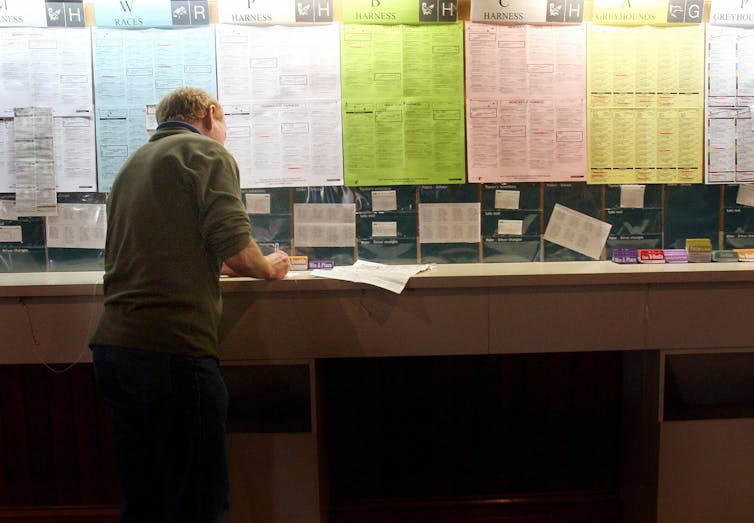
40 years of legal sports betting in Australia points to risks for US gamblers – and tips for regulators

Alex Russell, CQUniversity Australia
Australians love to gamble. It’s often said that if they could, they would bet on two flies crawling up a wall. The Sydney Opera House and Sydney Harbour Bridge were funded, in part, by government lotteries.
It’s only been five years since the U.S. Supreme Court overturned a federal law that essentially banned sports betting in most states, but in Australia, the novelty of legal sports betting has long worn off: It’s been legal since the 1980s.
I’ve been researching gambling in Australia since 2011, and I’ve been a team member on some major studies of online gambling. I’ve also led studies on risk factors for problematic sports betting and the harms associated with certain types of sports betting.
Americans just starting to get familiar with sports betting can learn some lessons from Australia’s approach to sports betting and the research on its effects.
A culture of gambling
Australia has a long history of state-sanctioned gambling, dating back to the first known organized horse racing event, which took place in 1810.
Bettors were initially required to go to a race track to place a bet. This was a hassle for many bettors, so illegal bookies started taking bets in places like bars. Their prices tended to be favorable because, unlike official bookmakers at the tracks, they didn’t pay a tax.
This prompted state governments to open off-course betting companies, starting with the state of Victoria’s Totalisator Agency Board in 1961. Other states soon followed.
While horse betting has long been legal in Australia, sports betting wasn’t legal until 1983. That year, Totalisator Agency Boards began taking bets on sports – typically soccer, cricket and boxing. Nongovernment sportsbooks didn’t appear until 1993, when Sportsbet became the first private company to obtain a license. Online sports betting followed, with Centrebet.com.au, an online gambling website, launching in 1996.
Today, many online operators take bets on sports, races and even things like what color tie the prime minister will wear.

Slowing the pace of bets
Gambling’s foothold in Australian culture has had a host of repercussions.
Australians are the biggest losers worldwide, losing more than twice as much to gambling per person than almost every other country. This is largely due to the ubiquitous presence of slot machines in hotels and bars. But Australians also lose more per capita on sports and race betting.
Because sports betting in Australia existed prior to online gambling, governments had to work out what types of betting to allow online. The country has regulations in place that restrict some forms of wagering, like fast-paced betting.
Slot machines, for example, are fast-paced, because each spin is a bet, and a person can easily slip “into the zone,” losing track of their spending. Online slots are banned for this reason.
Similar restrictions exist for online sports betting. Most people will place a bet before a match starts and will mostly bet on who will win, or possibly by how much they will win.
But, over time, more betting options have become available. People can now bet on who will score first, or next, or whether a certain number of points will be scored in a quarter or half. Since 2002, Australians have also been able to place bets “live” or “in-play” – in other words, during a game.

In Australia, live sports betting can be done, but not online. They must be placed by telephone call or at a venue, such as a bar, casino or betting shop, which is a storefront where people can place bets. This is partly to allow staff to intervene if someone is showing signs of problems, much like a bartender who can cut off a customer who has had too much to drink. Whether these interventions regularly occur is another matter.
There is also a particularly fast-paced form of sports betting, known as microbetting. Think of placing a bet on whether the next pitch in baseball will be a ball or a strike.
In studies I’ve conducted with other gambling researchers, we found that microbetting is done almost exclusively by higher-risk gamblers. In Australia, microbetting is not allowed even via phone calls, but consumers can access markets in other countries to place these bets, even though they are strongly discouraged from doing so.
Ads flood the airwaves
With so many online betting sites in Australia, there’s a lot of competition, which means Australians are inundated with gambling ads and promotions.
In fact, there are five times as many TV ads for gambling as there are alcohol ads – and Australia has a pretty big drinking culture.
These gambling ads are effective. A series of studies that I worked on, which were led by Professor Nerilee Hing from the Experimental Gambling Research Laboratory at CQUniversity, found that people who see more ads and promotions are more likely to bet when they don’t intend to, bet more than they intend, and place bets on more unlikely outcomes – meaning they lose more.
We also examined public advertising, such as TV ads, compared to direct messages, such as emails or text messages. We found that direct messages are more effective, can be personalized and may be harder to regulate because they are not public.
Australians can also use credit cards to place bets. These transactions are not treated as regular online purchases, but instead as cash advances, meaning there are no interest-free periods, and there are also higher interest rates and cash advance fees. Many consumers don’t realize this and end up being forced to fork over more money than they anticipated. Some gambling operators have even called for a ban on the use of credit cards for online gambling.
Regulations in play
Earlier, I pointed out that some of the key ideas around restrictions for online gambling are about reducing harm. But online gambling is still available at any time, as long as you have a phone or tablet, and just about all of us do. So, imagine someone experiencing a strong gambling urge, especially someone with little self-control. It’s easier than ever to place a bet via any number of payment methods, including credit cards, at any time, including when you’re drunk.
Fortunately, further regulations are being introduced.
The federal government is ultimately responsible for legislating online gambling in Australia. The National Consumer Protection Framework is a government initiative intended to implement changes to online sports and race betting, including restrictions on gambling promotions, and a national self-exclusion program.
Heavy bettors typically have accounts with multiple gambling operators, and if they wanted to opt out, previously they would have had to do so with each operator. Soon, they will be able to self-exclude in one place, through a government-run program called “Betstop,” and this will apply across all online operators.
Consumers are also able to set limits and monitor how much they have spent. As of 2019, every online gaming provider is required to offer deposit limits, although consumers do not have to take them up. However, our research team has found that voluntary limits – many of which are sky-high – only have so much use, and that mandatory limits with reasonable maximum levels would make a bigger difference.
Unlike Australia, where sports betting was legal before online betting was invented, U.S. states are introducing legalized sports betting at a time when technology allows for many types of betting products, including particularly dangerous ones. It is important for U.S. legislators and regulators to consider not just whether sports betting should be legal, but which betting products should be allowed, and what harm-reduction regulations could be implemented.
Different U.S. states have different restrictions on sports betting, with some not allowing it at all, some only allowing it in person, and some allowing just about everything, including online wagers. Some states also have restrictions on certain bet types.
While some people will argue that it is up to bettors to keep themselves safe, it is important to remember that no one sets out to develop a gambling problem. And gambling products are, by nature, addictive.![]()
Alex Russell, Senior Postdoctoral Fellow, CQUniversity Australia
This article is republished from The Conversation under a Creative Commons license. Read the original article.
















